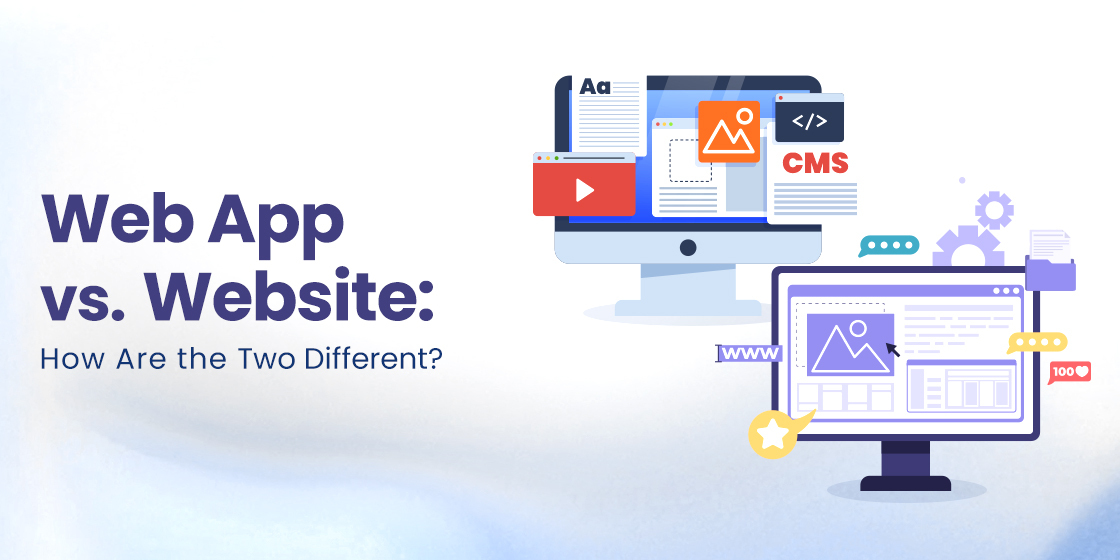Table Of Content
Discover What Differentiates Websites and Web Applications and Know Their Purpose
For an end-user, it’s difficult to differentiate between a web application and a webpage. That is especially true today, when it’s hard to identify the minute differences between the two. And it’s completely understandable too. An end-user is only concerned with accomplishing what they want to do. All they want is to enter the URL and get what they are looking for.
But for the developers, the techies, the ones who are going to develop the web app or website, they should be aware. Web app vs. website – that shouldn’t be something that would confuse them when confronted with a project.
Are you aware of the differences between the two? Let’s read on.
What is a Website?

A website, by definition, is a set of web pages that is publically accessible via the internet. These pages can contain text, images, videos, audio files, and more, which can be searched and accessed via the internet easily.
Now, there is no limit to the number of pages a website can have. We do have single page websites, and we also have websites with hundreds of pages. And the way they can be accessed is via a unique URL that is entered into a web browser’s search bar. For example, https://www.google.com/ is the URL for Google’s own search engine.
Today, there are many different categories of websites on the internet nowadays, like:
- Blogging sites
- Educational websites
- Portfolio websites
- Dating sites
- Government websites
- Personal websites
What Traits Identify a Good Website?
Many businesses opt to hire a web development company to create their brand website. The reason is that these companies are experienced in creating websites that visually and functionally appeal to their target audience.
The reason for that is that as the websites are mostly just vehicles for information distribution, they need to be visually appealing. And good visuals can mean the difference between an average site, and a successful site.
Good, simple websites are those that generally conform to these traits:
- User Friendly
User friendliness is something that is a given. End-users come in a variety of tech skill levels, and we need to ensure that even those with basic to no tech know-how are able to access and navigate through the website.
- Contain High Quality Content
As a medium of information distribution, high quality content is a must. You need to ensure that your information is factually correct, and answers the end-users’ questions successfully.
- Visually Appealing
Again, making sure the website has appealing visuals is a great way to ensure that your website is well received. You need to make sure that your design, structure, and content layout make the important details pop up while still looking attractive.
- Intuitive Navigation
Continuing on from the first trait, end-users come in different tech skills. Your website should have navigation that is easy to use for end-users, getting them to the piece of information they desire quickly and easily.
- Quick Load Times
People today have shorter attention spans. And with the advent of faster, better internet services, users tend to get frustrated if the website load times are too long. So a quick load time will be a great way to get in the user’s good graces
- Responsive Design
More and more people today are using mobile devices like phones and tablets over PCs. Therefore, when designing a website, you need to ensure that the site shows correctly across a variety of screen sizes and devices.
Different Types of Websites
Broadly categorized, there are two main types of websites static and dynamic. Static websites are generally technically simple, while dynamic websites are more complex to develop.
Static Websites
Static websites are developed using simple web development techniques including HTML, CSS, and JavaScript. By definition, they are called static because there is no backend functionality for these websites to interact with. Rather, they display their content statically, meaning in the same way for everyone.
Dynamic Websites
Dynamic websites are more complex, and are developed using advanced web programming languages and technologies, like C#, ASP.NET, SQL, and more alongside the HTML, CSS, and JavaScript. They do have a database and backend functionality, which allows users to interact with them. That means that the data displayed might be different based on the user scenario.
What is a Web App?

A web app, or web application, is a web-based software that combines functionality and interactive design into a cohesive whole. While you can use general web development tech stack, along with a few special technologies, in order to store and manipulate data from the app’s database.
These web apps are highly customizable, and based on the task you want them to perform, they can be used to add, delete, and update content within your database. This shows that web apps are more complex pieces of technology, and therefore, needs an experienced team of professionals to develop successfully.
Today, these web app design is quite extensively used by developers to create examples like:
- Shopping carts for e-commerce
- Video editing online tools
- Image editing online tools
- File format conversion tools
- Email clients
What are the Characteristics of a Web App?
There are a few more ways that a web app can be identified from a website. These characteristics are those that define the essence and the purpose of web apps. They are:
- Scalable
Web apps are designed to be scalable. That means that although at the start, the app would need to cater to a smaller pool of users, and will have a smaller set of features, as the company grows, the app too can grow with it.
- Hosted on the Cloud
Another thing that sets web apps apart, is the fact that they are hosted in the cloud. Unlike websites, with no backend functionality and databases, web apps require an online storage and processing facility to implement its backend functionality.
- Cross-platform
Cross platform apps are capable of running on different devices, running different operating systems such as iOS, MacOS, Windows, Android, Linux, or something else. All they need, is a compatible web browser, and the user will be able to access and use them without issue.
- Can be Tested using Automation Testing
Web apps are developed using pre-existing frameworks, and as such can be tested using automation testing, making it easy to develop and deploy a web app.
Web Apps Vs. Websites – When Do You Need Them?

Both web apps and websites serve their purposes in today’s digital world. A website is tasked with distributing knowledge, while a web app is designed to interact with a user in order to fulfill a specific task.
Therefore, we cannot say that one has made the other obsolete. Let’s take a look at why we need websites and web apps specifically.
Reasons Why You Need a Web App
Web apps are fast becoming the norm nowadays, as more and more companies are implementing different actions and interactions within their websites. For example, authors with simple, personal websites, are now adding online shopping options to sell their books and other merchandise.
The reasons for this recent popularity is because:
- Web apps are easy to maintain and update for all users
- Easy to customize, as you can add new features and design updates near instantly
- Web apps are highly secure, as the data is stored in the cloud, which is usually highly encrypted to prevent unauthorized access
- No need for approval from different app stores, since all they need to run is a compatible web browser
- Most web apps support nearly all major web browsers, like Chrome, Firefox, Safari, etcetera
Why is a Website the Better Option for You?
As web apps are becoming more popular, you might be asking yourself whether a website is the right option for you. Well, essentially, the answer is a resounding YES. That is because:
- Any business, no matter how small, can benefit from a website where they showcase their products or services to anyone with an internet connection
- It’s a great way to establish and grow a brand at a much lower cost
- It’s a way of establishing social proof and credibility, so that others can be sure that you are who you claim to be
- Allows potential customers to find you easily
- Can also generate a small income stream if you opt to rest you page space for online advertising and monetization.
Web App Vs. Website – Are They the Same?
By now, you might be able to differentiate between websites and web apps now, even you have a passing grasp of tech concepts. Therefore, in order to sum the topic up, we will now note some of the primary differences as a way of refreshing the topic.
So, essentially, the main differences between the web app vs. website debate, are:
| Web Apps | Websites |
| Usually require authentication because they allow the ability to manipulate your database, such as add, delete, or update your data | Authentication is neither necessary, nor required for a website, unless you need to sign up for something |
| The pages generally allow for interactions and manipulation, as well as displaying visual and textual information | Are primarily used to display visuals and text for the end-users |
| The information given is usually restricted behind authentication protocols | The information given is publically accessible |
| Requires a little navigation and interaction to get to the exact thing you desire sometimes, making it a little more complicated | They will show up when the user searches for something related to the information given on the website |
| Harder to develop, as it requires more advanced development techniques | Easy to develop |
| Expensive to host as cloud services are gnerally required to run them | Cheaper hosting |
Summing Up
To sum it up, Web app vs. website is a debate that comes down to one simple fact – what do you need?
Essentially, you need to choose a website if you want to display information regarding your products or services. If all you need to do is give information, then there is no need to build a web app. However, if you want the user to interact too, such as buy your product or service after reading about it, then a web app is what you are going to need.
As a developer, you will often have to evaluate the project requirements, before guiding your clients one what they should build. That is because many non-technical stakeholders have no idea about these differences, and that can often become a source of miscommunication within the team. Therefore, before breaking down the project into its non-functional and functional requirements, you need to ensure that you know exactly what you will be building.
FAQs
| Is Facebook a website or a web application? Facebook is a web app, as the pages offer a variety of interactions and personalization options, something that websites lack by definition. |
| Is Netflix a website or a web app? Netflix is more of a web application than it is a website, due to its very nature as a searchable library of content. |
| Is YouTube dynamic or static? YouTube is dynamic, as its looks, content and style can change according to user inputs. |
| What makes a good web app? The following factors are some of the critical features that make a web app good: – A quick onboarding process – Value proposition easy to understand – Single purpose app flow – Navigation should be intuitive – Follow the current industry metrics and trends |
Empower your digital initiatives with BariTechSol, a premier custom software development company. Our skilled team tailors cutting-edge solutions to your unique needs. Elevate your tech experience and stay ahead in the digital realm. Partner with BaritechSol and code the success of your next big idea.


